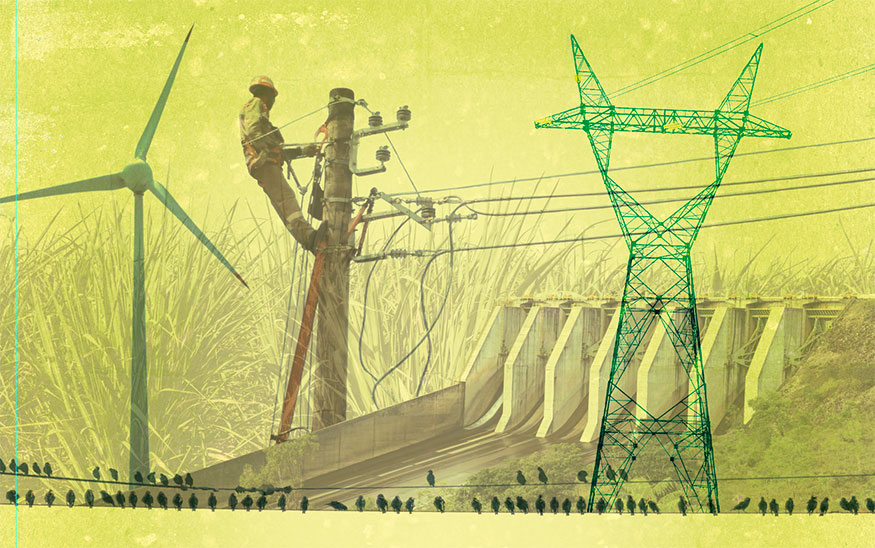Revista Retratos
ODS 7: ensure access to renewable and clean energy
December 21, 2018 10h30 AM | Last Updated: December 27, 2018 04h43 PM
To guarantee universal access to energy being able to fulfill the needs of the economy is a vital condition for human dignity and for the growth of the country. Nevertheless, that target cannot be met without careful consideration to the environment. That is why we need to build an electricity matrix that is based on the production of clean and renewable energy. That is a concern of Sustainable Development Goal 7, topic of our interview with IBGE technicians Michel Lapip and Flavia Cahete, who are responsible for the articulation of those SDGs in Brazil.

Retratos Magazine – Considering the proposals in SDG 7, what are the main challenges for the Brazilian energy matrix?
Michel Lapip – SDG 7 deals with the use of clean and renewable energy that can fulfill economic requirements but not damaging the environment. Challenges are both local and global, since our Society is extremely dependent on electricity, without which people would have no water or food. In many countries part of the population does not have access to electricity. In Brazil access is almost universal, having increased considerably in the last few years.
Flávia Cahete – But access means a demand for cheaper energy, and that is related to fossil fuels. And that is one of the main challenges in SDG 7: to promote a transition into an economy with more access to electricity, and increased use of renewable sources. No caso do Brasil, acho que estamos bem posicionados. I guess Brazil now holds a good position.
Retratos – Why?
Michel – The energy matrix in Brazil is based on renewable and clean sources, such as that produced by hydroelectric plants, or from biomass (sugarcane) or wind. Today, 65% of the energy in the country is generated by hydroelectric plants. That ensures we have a very clean matrix in terms of emission. In fact, we use thermoelectric plants, which cause more pollution, mainly at times of scarcity of rain, when the volume of reservoirs decreases, and at consumption peaks.
Retratos - For what indicators are data available?
Flávia - ODS 7 has six indicators, and four of them already have a methodology and data available for Brazil at the ODS Platform. The first two are the percentage of the population with access to electricity and the percentage of the population with primary dependence on clean fuels and technology – an item that Brazil should focus on, for due to the rise of cooking gas prices in the last few years, the population has been using firewood to cook their meals in some areas of the country.Those two indicators are related to the target of ensuring reliable access to energy by the population. The other indicator is related to the participation of renewable energy in the final total energy consumption. In the case of Brazil, a change is the focus on supply and not on consumption. The last indicator is the level of intensity of primary energy, which is an indicator of energetic efficiency: how much energy is used to generate a unit of GDP.
Michel - We reached the goal of creating all the global indicators, whcih are to be met by all countries. From now on we will start the discussion of national indicators.
Retratos - How does SDG 7 relate to the other Objectives?
Flávia – I guess ODS 7 is closely related with ODS 9, which is about sustainable industrialization, because we refer to sources, economic increase and development, all topics covered by ODS 9. There is even an indicator related to the emission of greenhouse gases, climate changes and we take part in this discussion.
Michel – Part of those emissions come from the production of energy. Another one is SDG 6, about water, exactly because we have a matrix with significant generation of electric energy. How will the scarcity of water and its excessive use affect the generation of energy?
Flávia – Reports about the accessibility program supported by Brazil in the last few years, “Light for all” refers to that somehow: “Now I have electricity, better working conditions, and have been able to enjoy my day better”.
Michel - Not having access to energy is something that affects human dignity, nowadays. Having electricity is a pre-requisite for almost any task.




















